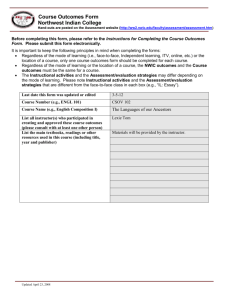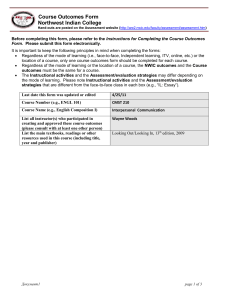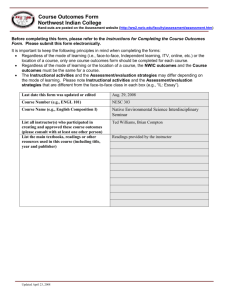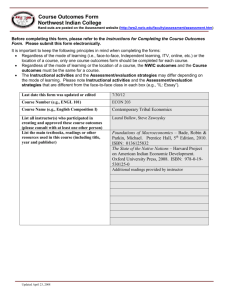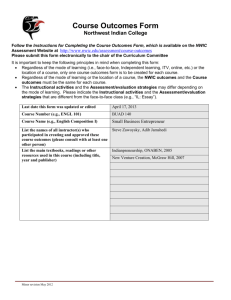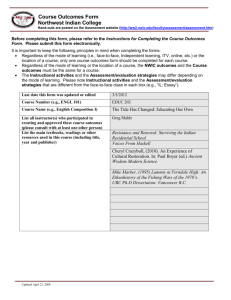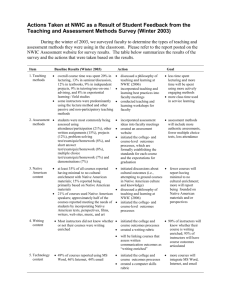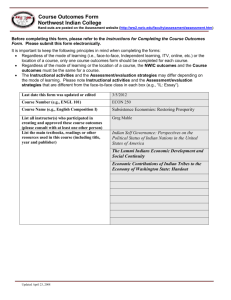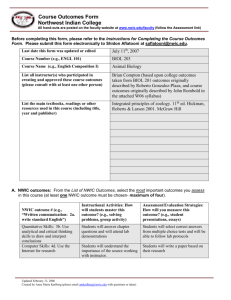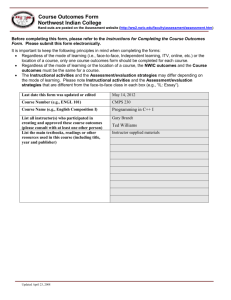CARE 395 - Northwest Indian College
advertisement
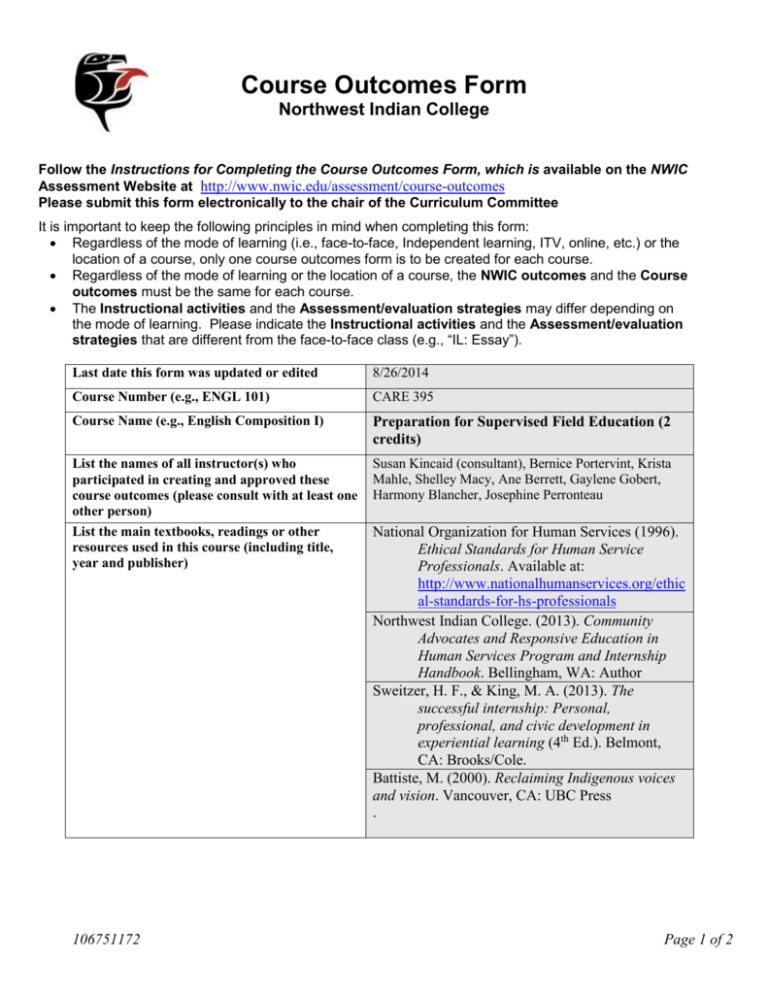
Course Outcomes Form Northwest Indian College Follow the Instructions for Completing the Course Outcomes Form, which is available on the NWIC Assessment Website at http://www.nwic.edu/assessment/course-outcomes Please submit this form electronically to the chair of the Curriculum Committee It is important to keep the following principles in mind when completing this form: Regardless of the mode of learning (i.e., face-to-face, Independent learning, ITV, online, etc.) or the location of a course, only one course outcomes form is to be created for each course. Regardless of the mode of learning or the location of a course, the NWIC outcomes and the Course outcomes must be the same for each course. The Instructional activities and the Assessment/evaluation strategies may differ depending on the mode of learning. Please indicate the Instructional activities and the Assessment/evaluation strategies that are different from the face-to-face class (e.g., “IL: Essay”). Last date this form was updated or edited 8/26/2014 Course Number (e.g., ENGL 101) CARE 395 Course Name (e.g., English Composition I) Preparation for Supervised Field Education (2 credits) List the names of all instructor(s) who participated in creating and approved these course outcomes (please consult with at least one other person) List the main textbooks, readings or other resources used in this course (including title, year and publisher) Susan Kincaid (consultant), Bernice Portervint, Krista Mahle, Shelley Macy, Ane Berrett, Gaylene Gobert, Harmony Blancher, Josephine Perronteau 106751172 National Organization for Human Services (1996). Ethical Standards for Human Service Professionals. Available at: http://www.nationalhumanservices.org/ethic al-standards-for-hs-professionals Northwest Indian College. (2013). Community Advocates and Responsive Education in Human Services Program and Internship Handbook. Bellingham, WA: Author Sweitzer, H. F., & King, M. A. (2013). The successful internship: Personal, professional, and civic development in experiential learning (4th Ed.). Belmont, CA: Brooks/Cole. Battiste, M. (2000). Reclaiming Indigenous voices and vision. Vancouver, CA: UBC Press . Page 1 of 2 A. NWIC outcomes: From the List of NWIC Outcomes, select the most important outcomes you assess in this course (at least one NWIC outcome must be chosen- maximum of four). NWIC outcome # (e.g., “Written communication: 2a. Write Standard English”) Effectively communicate in diverse situations, from receiving to expressing information, both verbally and nonverbally. (1) Instructional Activities: How will students master this outcome? (e.g., solving problems, group activity) Lecture, readings, shadowing professionals, writing learning outcomes, develop resume, speakers, class activities. Assessment/Evaluation Strategies: How will you measure this outcome? (e.g., student presentations, essays) Attendance, professional resume, quiz, essay, field education contract. B. Course outcomes: In order of priority, list the most important other learning outcomes for this course that you assess (a maximum of 10). [NOTE: These outcomes are equal in importance.] Other course outcomes: Complete the sentence – As a result of this course, students will be able to… Define field education and differentiate field education from volunteering and service learning. Instructional Activities: How will students master this outcome? (e.g., solving problems, group activity) Develop criteria for a successful field education appropriate to individual learning goals, and use the criteria to evaluate specific field education possibilities. Demonstrate understanding of the field education manual, specific paperwork requirements, appropriate professional behavior, and the expectations of the placement agency and the Tribal Human Services Program of Northwest Indian College. Submit appropriate paperwork for first quarter of field education (CARE 495). Lecture, readings, shadowing professionals, writing learning outcomes, develop resume, speakers, class activities. Attendance, professional resume, quiz, essay, field education contract. Lecture, readings, shadowing professionals, writing learning outcomes, develop resume, speakers, class activities. Attendance, professional resume, quiz, essay, field education contract. Lecture, readings, shadowing professionals, writing learning outcomes, develop resume, speakers, class activities. Attendance, professional resume, quiz, essay, field education contract. Lecture, readings, shadowing professionals, writing learning outcomes, develop resume, speakers, class activities. Assessment / Evaluation Strategies: How will you measure this outcome? (e.g., student presentations, essays) Attendance, professional resume, quiz, essay, field education contract. C. List the NWIC outcomes and course outcomes from above on your syllabus. D. Assess the NWIC outcomes and course outcomes, which are listed above, in your classes. 106751172 Page 2 of 2
